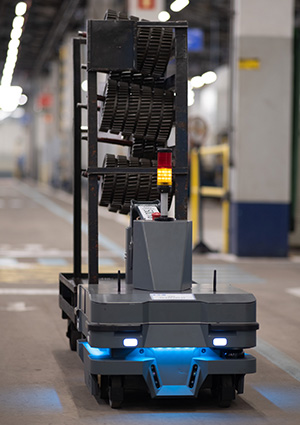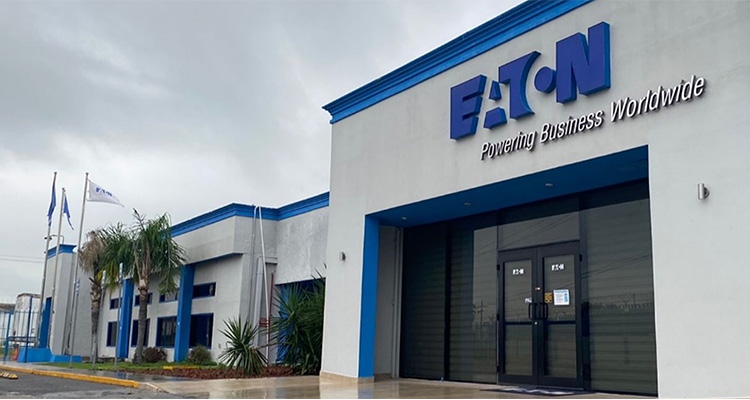Discover Eaton Mobility Group’s strategic and agile approach to seamless power management
From planes, cars, and electric vehicles (EVs) to homes, hospitals, factories, and data centers, demand for power is on the rise around the globe. While people rely on these things every day, the companies behind them require industry expertise to help them successfully navigate power management challenges.
Working in more than 175 countries, Eaton Mobility Group (Eaton) is a power management company committed to providing reliable, efficient, safe, and sustainable technologies that help customers better manage electrical, hydraulic, and mechanical power. With a motto of ‘we make what matters work,’ Eaton’s products and services make a difference by improving lives and protecting the environment.
“As a power management company working in the mobility market for over 100 years, our agile product portfolio has constantly adjusted to meet emerging market demands,” begins Peter Denk, President of Eaton. “We have a broad portfolio that aims to provide solutions to customers across several markets, including commercial and off-road vehicles. For these sectors, we provide components for combustion engines, such as engine valves, superchargers, valve actuation, torque solutions, and some fuel emissions solutions. We’ve also acquired a business that focuses on power connections, providing reliable connectors for the automotive industry.

“In recent years, our focus has been on the global transition towards EVs, finding ways to apply our technologies and expertise to a rapidly changing market. As EVs proliferate, there is increased demand for power and more technically challenging applications. The electrical sector accounts for around 75 percent of our overall business, but as we go into EVs specifically, they require a new portfolio of inverters, power connections, and power protection.”
Eaton boasts a strong heritage working within the power management and safety of the electrical sector, which can be seamlessly applied to the automotive industry. “We’ll continue to play a key role in the EV transition because our customers recognize our electrical expertize and more than 100 years of delivering automotive-level quality,” Denk explains. “As the vehicle propulsion shifts, we’ll continue to transition our portfolio to support the world’s energy transition.
Leveraging knowledge
“Rather than innovating new technologies, we’re identifying ways to repurpose existing ones. We recently launched a brand-new circuit protection product called Breaktor®, for example, which was created in 2015 within our electrical division, but we’re now first-to-market to implement the product on cars. Breaktor® improves vehicle safety and protects components from any level of overcurrent condition, as well as being resettable like a circuit breaker, which enables reactivation of the device following a functionality check rather than a service appointment.
“For EVs, we offer inverters and gearing aimed at the transition of a range of medium and heavy-duty vehicles,” he states. “We’re leaning into our background in torque and transmissions for traditional vehicles to understand how we can bring new applications to market. We’re not a new and disruptive business, but instead, we’re using our rich heritage, experienced people, and strong manufacturing footprint as a strategic advantage. Leveraging this knowledge has enabled us to learn about the next generation of EV solutions while catering to local demands.”
 However, while Eaton is catering to the EV market, Denk is quick to highlight that it has not taken off as quickly as first anticipated. “There was some initial anxiety around EVs, with unrealistic projections about when combustion engines would cease to exist,” Denk shares. “From a business point of view, manufacturers in the EV sector focused on finding product solutions, but in doing so, prioritized the product over the consumer. However, the market moved too fast before the necessary infrastructure was prepared, and most importantly, before consumers were ready to adopt EVs.
However, while Eaton is catering to the EV market, Denk is quick to highlight that it has not taken off as quickly as first anticipated. “There was some initial anxiety around EVs, with unrealistic projections about when combustion engines would cease to exist,” Denk shares. “From a business point of view, manufacturers in the EV sector focused on finding product solutions, but in doing so, prioritized the product over the consumer. However, the market moved too fast before the necessary infrastructure was prepared, and most importantly, before consumers were ready to adopt EVs.
“Today, with ongoing and upcoming regulatory changes, we’re waiting to see how consumer behaviors change over the next couple of years. Considering Eaton’s historic involvement in the electrical sector, we’re in a unique position working across the board from passenger vehicle EVs to commercial applications and heavy-duty trucks. We’re working with our suppliers and partners to learn more about EV applications and educate consumers on the benefits.”
Thoughtful automation
When it comes to production, Eaton leverages a unique approach to automation. “We’re repurposing a lot of our equipment and designing flexible solutions in a slow but steady automation strategy,” Denk says. “We’re using automated guided vehicles (AGVs) to pick up and deliver materials to our lines. Although we still have people working on the lines, we ensure lines are optimized so that a cobot can be easily integrated to ramp up production as demand increases. I like to think of this as slow and thoughtful automation, as we design processes for long-term success and later invest in automation infrastructure once the line is established rather than implementing automation from the beginning.
“This also fosters flexibility and the ability to adjust to new practices and regulations. For instance, as demand for superchargers has declined, we’ve repurposed around 20 engineers from producing superchargers to creating inverters or EV gearing, which are in increased demand.”
With the EV market still evolving, Denk shares his thoughts on Eaton’s future: “The transition to EVs is a huge challenge and opportunity for us, and we must remain agile and agnostic to move with the market and continue solving our customers’ problems. Our motto of ‘making what matters work’ will drive everything we do as we continue to provide the correct infrastructure solutions at an appropriate cost.
“We must be ready for what’s next, whatever that might be,” Denk concludes. “Whether its automotive, commercial vehicles, or aftermarket sales, the market is going to be very dynamic in the coming years. By placing talented people in the right roles, we’re preparing for whichever way the market goes, and we’ll continue to solve problems as customers bring them to us.”
